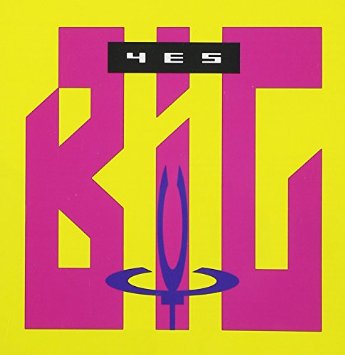
Big Generator (1987)

1. The Rhythm of Love
2. Big Generator
3. Shoot High Aim Low
4. Almost Like Love
5. Love Will Find a Way
6. Final Eyes
7. I'm Running
8. Holy Lamb (Song for Harmonic Convergence)
Riding the massive success of 1983’s 90125, Yes suddenly found itself with a whole new generation of fans—many of whom had no idea what they were signing up for in terms of the band’s internal drama. “Harmony” may have described some of their vocal arrangements, but it certainly didn’t apply to their working relationships. Jon Anderson, for one, was reportedly disenchanted with the project before they even properly got started. Trevor Horn—producer and brief ex-vocalist—bailed early on, clashing with Tony Kaye. And that was just the beginning of the creative tug-of-war that would define Big Generator.
In theory, Big Generator was supposed to be 90125 Part Two: more punchy, radio-friendly singles, more sleek production, more of Trevor Rabin’s modern pop-rock sensibilities welded to Jon Anderson’s otherworldly tenor. In practice, the album retains some of that DNA but feels noticeably less inspired. It’s not for lack of trying—if anything, it’s trying *too* hard. You can practically hear the studio battles bleeding through the glossy 80s production. It’s still “80s Yes” in every sense, but with less of the fresh, catchy sheen that made 90125 such a shockingly effective reinvention.
It’s not all bad news. Tracks like Big Generator and Final Eyes prove the band hadn’t completely run dry on ideas. Both have strong sections—clever hooks, melodic flashes—but they lack the tight focus and memorable punch of their predecessors. The title track, in particular, drowns under layers of sound effects and studio trickery, smothering any real melodic drive. Ironically, it’s the one time their 80s maximalism actively works against them instead of for them.
The one track where their experimentation pays off is Shoot High Aim Low. Slower and bluesier than the rest, it gives the band some space to breathe and evolve within the song. It’s not instantly accessible, but with a few listens it reveals itself as one of the album’s more rewarding efforts. On the other end of the spectrum, songs like Rhythm of Love and Love Will Find a Way play things much safer. They didn’t hit Owner of a Lonely Heart–level ubiquity, but they did well enough on rock radio to keep Yes in the conversation for a few more years.
The rest of the record? A mixed bag at best. There are good ideas sprinkled throughout and a few catchy melodies, but the production often feels overworked and undercooked at the same time. The whole thing has the unmistakable vibe of a band not entirely sure what it wants to be, caught between the sleek pop ambitions of their last hit and their prog-rock legacy. The result is a decent record—far from a disaster, but just as far from essential Yes.
It’s worth saying that Trevor Rabin remains both the best and most divisive thing about this era of the band. His approach is a world away from the 70s sound that made Yes famous, but he deserves credit for pushing them somewhere new and giving them a real shot at longevity in the MTV era. Even on Big Generator, where the formula is starting to wear thin, Rabin’s presence keeps the whole enterprise from collapsing under its own weight.
Go to the Next Review
Go back to the main page